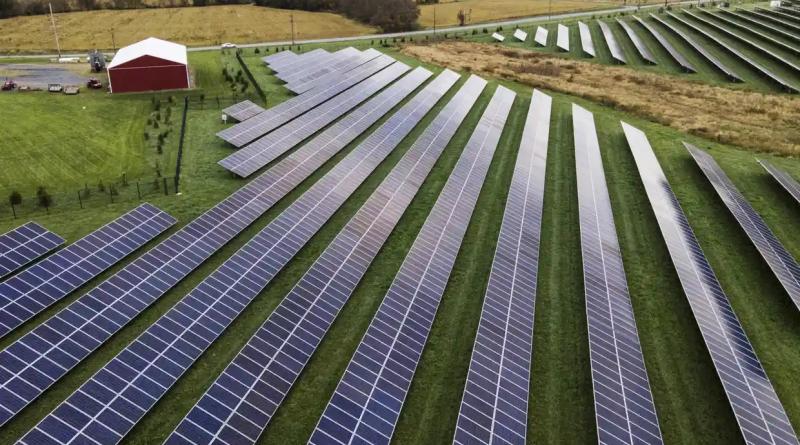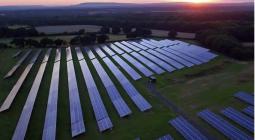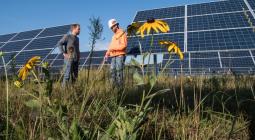Landowners call for scrapping of plans to ban solar energy from England’s farmland

Farmers say having solar sites allows them to subsidise food production during less successful years
Farmers have urged whoever succeeds Liz Truss as UK prime minister to abandon plans to ban solar energy from most of England’s farmland, arguing that it would hurt food security by cutting off a vital income stream.
Truss, who resigned on Thursday, and her environment secretary, Ranil Jayawardena, hoped to ban solar from about 41% of the land area of England, or about 58% of agricultural land, the Guardian revealed last week.
They planned to do this by reclassifying less productive farmland as “best and most valuable”, making it more difficult to use for energy infrastructure.
Members of the Country Land and Business Association (CLA), which represents 33,000 landowners, told the Guardian having solar on their less productive land allowed them to subsidise food production during less successful years, as well as providing cheap power for their estates and homes in their local area.
Mark Tufnell, the president of the CLA, grows oats, wheat and barley on his Cotswolds estate. He said: “We have members who say these are temporary sites if needs be, they are then able to concentrate on growing more food on their other land.
“The solar would be on their less good land, and … if that is what they so choose to do, why shouldn’t they be allowed to do it?”
He added that the land was not lost to agriculture as the sties were easy to remove, and the area could be grazed with sheep. “There is no reason as to why the area underneath it couldn’t be grazed with sheep, but it could also provide very good habitat for farmland birds and increase biodiversity so help the environment.
“I don’t see that saying with the strike of a pen that we are going to exclude this land, I don’t see that it helps, and I think that it is unlikely to help food security in any case.”
The real problem with the government’s solar strategy, he said, was how difficult it was to put solar on rooftops.
Tufnell said: “There are so many things they could do that they aren’t doing, like incentivising solar rollout on roofs, changing the planning system to allow it. I already have 49kW, and I want to have another 100kW on my buildings, but the hardest thing to do is getting a connection to the grid at a price that is affordable. They are very slow, the price is incredibly high, and in my case I could have to put in a mini substation, which is very expensive.
“What I am trying to do is put solar panels on a building which I am converting into offices and workshops, if there is any excess I would like to use it for the houses in the village. But it is becoming so difficult and expensive that it is very off-putting, and if I wasn’t so persistent I would think frankly I can’t be bothered.”
Harry Teacher, a fruit and arable farmer in Kent, has a large solar park on his land, which helps bring in income when his farm has a bad year.
He said: “We put in a park in 2014, ground-mounted panels on frames on about 61 acres of land. We are a fruit and arable farm but we are quite highly diversified, and any farmer has been encouraged to find sources of income other than arable, and solar panels were part of that diversification. For us it is a source of constant income. It gives our business a greater resilience.”
Teacher does not understand all the fuss, adding: “As a proposition they are quite easily hidden by a large hedge. They don’t make noise, there are no moving parts. Carbon is a serious thing we all have to consider now, solar panels have to be part of that. If the argument is that the land is lost for food – you may be aware that the planning applications for solar parks are done on a temporary basis – ours is a 25-year period. If, for whatever reason, we run out of food, which is extraordinarily unlikely, we can pull it all up and restore it to agriculture.
“We make unequivocally more from our solar panels than from farming. There is a gut reaction people have to any sort of greenfield development and it is more of a reaction to people’s response to seeing solar parks – I don’t think it’s a real fear for food production.”
Landowners say banning the use of farmland for energy infrastructure would hurt food security by severing a vital income stream. Photograph: Julio Cortez/AP





